Catholic

Are the media pulling their punches when it comes to Pope Francis?
Whether it’s because he carries his own bags or cold-calls troubled Catholics who write to him, or because he so clearly loves interacting with crowds or drives a beat-up Renault around the Vatican, it’s hard to tell. But at some point, much of the world’s media fell for the new pope.
Now an increasing number of Vatican insiders are asking whether the largely positive view of Francis affects the way the media cover the Holy See.
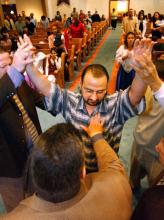
A new survey of Hispanic political and religious values finds they’re overwhelmingly Democrats who hold a largely negative view of the Republican Party.
The 2013 Hispanic Values Survey of 1,563 Hispanic adults was conducted online in both English and Spanish between Aug. 23 and Sept. 3. It has a margin of error of plus or minus 3.7 percentage points.
The survey found that most Hispanics are delighted with Argentine-born Pope Francis, but they hold slightly less favorable views of the Catholic Church. While nearly 69 percent look favorably on the pope, only 54 percent see the institution in a favorable light.
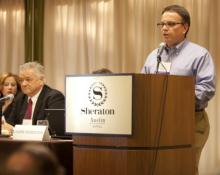
The Christian mission field “is a magnet” for sex abusers, Boz Tchividjian, a Liberty University law professor who investigates abuse said Thursday to a room of journalists.
While comparing evangelicals to Catholics on abuse response, ”I think we are worse,” he said at the Religion Newswriters Association conference. But it’s harder to track.
“Protestants can be very arrogant when pointing to Catholics,” said Tchividjian, a grandson of evangelist Billy Graham and executive director of Godly Response to Abuse in the Christian Environment (GRACE), which has investigated sex abuse allegations.
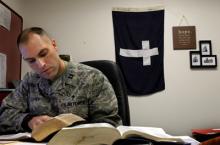
Catholic military chaplains cannot be forced to witness or bless a same-sex marriage, nor are they allowed to take part in any marriage counseling retreats that are open to gay couples under new rules issued by the Archdiocese for the Military Services.
The rules, sent to chaplains on Sept. 18 by Archbishop Timothy P. Broglio, head of the AMS, also bar chaplains from taking part in a funeral for a Catholic if that participation “would give the impression that the church approves of same sex ‘marital’ relationships.”
But the new rules also set out conditions that would allow Catholic military commanders to comply, without violating their beliefs, with rules giving same-sex couples under their command federal employee benefits as required by law.

Pope Francis criticized what he called the “idolatry of money” on Sunday in a trip to one of the poorest regions of the European Union.
The pontiff, visiting the island of Sardinia off Italy’s western coast, departed from his prepared remarks to talk about his own family’s struggles as Italian immigrants in Argentina. Speaking on an island where more than half of workers under 30 are unemployed, Francis told the masses: “Don’t let yourselves be robbed of hope.”
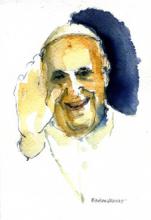
Pope Francis’ comments last week on everything from gays to abortion (less talk, more mercy), the hierarchy (be pastors, not bureaucrats), and religious faith (doubt is part of belief) continue to reverberate through the church and the media.
Here are five broader insights that this wide-ranging interview revealed about Francis — and why they will be keys to reading his pontificate, and perhaps the future of Catholicism.
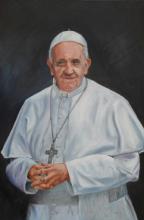
Pope Francis’ friendly letter to atheists, published this week by Italy’s La Repubblica newspaper, has been cheered by Catholics who welcomed another sign of the pontiff’s new openness to the world beyond the Vatican walls.
But it has also prompted some gnashing of teeth among others, who are reacting to headlines about the pope’s letter like this one in the British newspaper The Independent:
“Pope Francis assures atheists: You don’t have to believe in God to go to heaven.”
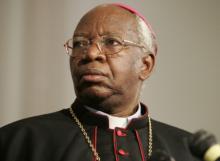
Excommunicated Zambian Archbishop Emmanuel Milingo, who advocates for married priests within the Roman Catholic Church, said he has not split from Rome though many of the priests he ordained no longer see themselves as part of the church.
“We are not a breakaway church,” said Milingo, who married Maria Sung, a Korean acupunturist, in 2001. “Within the Catholic Church married priests existed for a thousand years.”
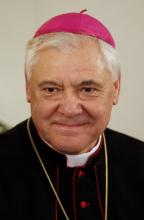
A progressive theological current that emphasizes the Catholic Church’s closeness to the poor and the marginalized but was subject to decades of hostility and censure is now finding increasing favor in the Vatican under Pope Francis.
Francis, who has called for “a poor church for the poor,” will meet in the next few days with the Rev. Gustavo Gutierrez, a Peruvian theologian and scholar who is considered the founder of liberation theology.
The meeting was announced on Sunday, Sept. 8, by Archbishop Gerhard Ludwig Mueller, prefect of the Congregation for the Doctrine of the Faith, the Vatican’s doctrinal watchdog, during the launch of a book he co-authored with Gutierrez.
IN 1900, long-simmering resentment over increasing foreign presence and exploitation in China boiled over into a full-scale uprising, the Boxer Rebellion. It was spearheaded by the “Righteous and Harmonious Fists,” a peasant secret society whose members practiced martial arts—Westerners, observing their exercises, dubbed them “Boxers.” The Boxers targeted foreign officials, merchants, and missionaries, as well as Chinese Christian converts.
Comic book author and artist Gene Luen Yang illuminates two very different fictional perspectives on this conflict in his new two-volume graphic novel Boxers & Saints: The first volume, Boxers, tells the story of Bao, a boy who becomes a Boxer leader after seeing ongoing abuse by Westerners; Saintsfollows Four-Girl, an unwanted daughter who converts to Catholicism, takes the name Vibiana, and must flee the Boxers.
Yang’s 2006 work American Born Chinese was the first graphic novel to both win the Michael L. Printz Award for excellence in young adult literature and to be nominated for a National Book Award. He lives in Oakland, Calif., and teaches in the Hamline University MFA program in writing for children and young adults. Sojourners senior associate editor Julie Polter interviewed Yang in July. Boxers & Saints releases in September from First Second Books.
Julie Polter: The characters in Boxers & Saints are driven by varied combinations of ideology (patriotism, cultural imperialism) and mysticism/faith. The flaws and virtues of different beliefs seem to mirror each other. What led you to this complicated story?
Gene Luen Yang: The genesis of the project was out of my own conflicts. I majored in computer science in college and minored in creative writing. I had a professor who was also a novelist, Thaisa Frank. I remember visiting her during office hours and talking to her about my struggles with writing about issues of faith. Faith, especially in college, became very important to me; it became a critical part of how I saw my place in the world. It was really hard for me to put something authentic on the page. Her advice to me was, essentially, you have to write your life and live your faith—you don’t ever try to write your faith, because it will come out funky. That’s the advice I’ve tried to follow ever since.
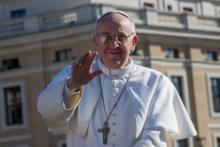
In message published on Friday, Pope Francis took the rare step of personally expressing his “esteem and friendship” to the world’s Muslims as they prepare to celebrate the end of the Ramadan fast.
While it is a long-established Vatican practice to send messages to the world’s religious leaders on their major holy days, those greetings are usually signed by the Vatican’s department for interfaith dialogue.
In his message, Francis explains that in the first year of his papacy he wanted to personally greet Muslims, “especially those who are religious leaders.”
Francis’ predecessor, Pope Benedict XVI, had fraught relations with Muslims. In a 2006 speech he quoted a Byzantine emperor who said Muhammad had only brought “evil and inhuman” things to the world, sparking a worldwide crisis in Christian-Muslim relations.
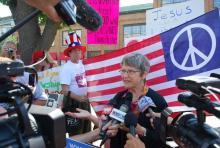
Sister Simone Campbell, the face of the famous “Nuns on the Bus” tours, and Rep. Paul Ryan, the brains behind the House Republicans’ budget-cutting plans, have for more than a year represented diametrically opposed camps on how to apply Catholic social teaching to American fiscal policy.
At a House Budget Committee hearing on Wednesday, the two Catholics had a chance to square off as the sister testified before Ryan’s committee about hardship in America as the nation nears the 50th anniversary of President Johnson’s 1964 declaration of the “War on Poverty.”
Yet there were few fireworks nor much in the way of theological debate, as Ryan, R-Wis., did not go out of his way to champion the GOP budget plan that bears his name. That plan focuses on cutting social programs that Campbell says are key to supporting struggling Americans and also boosting the economy.
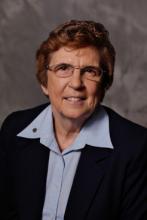
The organization representing Catholic hospitals across the country says it no longer objects to the Obama administration’s mandate that all employees receive free birth control coverage.
The decision by the Catholic Health Association puts the hospitals at odds with the Catholic hierarchy, which last week rejected the White House’s final regulations on an issue that many church conservatives view as evidence of the administration’s hostility to Catholicism and religious freedom.
Sister Carol Keehan, head of the CHA, disagreed. “If you look at the final regulations it is very clear that we do not have to contract for, or pay for, or arrange for” contraception coverage, Keehan said in an interview on Tuesday.
“It was really important that this be workable from a legal and theological perspective,” she added. “That’s what we believe we have achieved.”
...The army is used as "an institution that promotes social cohesion" and a "principal place" of forming national consciousness and participating in the nation building project "as conceived by the authorities, i.e. promoting Israel as a Jewish national state". In this perspective, according to the Justice and Peace commisssion operating in the Holy Land, "talk about drafting of Christian Arabs rather than the Arabs in general - Muslims and Christians - is clearly an attempt to drive a wedge between Christians and Muslims in Israel". On addressing these delicate problems, the Church should keep in mind that "the army is used as a means of imposing and maintaining the occupation of Palestinian territories and thus preventing Palestinians from achieving dignity and independence". The army is primarily "an army of aggression rather than an army of defense". Therefore "the use of army service to divide the Arab population against itself is detrimental to the interests of the Arabs as a community."
THE FONDEST memories I have of Kathy Kelly are of her singing. It’s safe to say that her three nominations for the Nobel Peace Prize were not for her voice, which is sometimes sweet but often a touch out of key. At times I’ve imagined her feeling briefly self-conscious about this, but that passes. The song remains, and I am again reminded of just how deeply this woman can move me.
In spring 1999, in a small banquet room at Georgetown University, I first heard Kelly sing and speak about the suffering in Iraq. A crowd of about 200 people had gathered to hear about her work. She had been to Iraq dozens of times to put a human face on the conflict there and to defy the drastic financial and trade embargo that the U.N. Security Council had imposed shortly after Iraq’s 1990 invasion of Kuwait.
She briefly went over the statistics—the deep poverty, the lack of medicines, the estimated half-million children who had died, many due to the U.N. sanctions, enforced in part by a U.S.-led blockade—but she quickly moved on. Statistics weren’t her strength.
Instead she spoke from the heart. Kelly talked about the ordinary Iraqis she had met: the worn women who served her tea and biscuits they could barely afford, the countless kids in threadbare hand-me-downs who ran after her merrily in the street, the tired doctors who broke down crying as they remembered all the children they had lost, the stone-faced parents who accepted her condolences because they didn’t know what else to do.
She also told the story of Zayna, a 7-month-old baby girl who died of malnutrition shortly after Kelly visited her in the hospital.
The twin Supreme Court rulings on Wednesday that further opened the door for gay marriage in the U.S. were not entirely unexpected, and the condemnations from religious conservatives angry at the verdicts were certainly no surprise either.
So the real question is what gay marriage opponents will do now.
Here are four possible scenarios that took shape in the wake of Wednesday’s developments:

When it comes to God and country, white evangelicals report the strongest levels of patriotic feelings in a new poll, with more than two-thirds (68 percent) saying they are extremely proud to be an American.
That figure was markedly higher than for white mainline Protestants (56 percent), minority Christians (49 percent), Catholics (48 percent) and religiously unaffiliated Americans (39 percent), according to the study, conducted by the Washington-based Public Religion Research Institute in partnership with Religion News Service.
White evangelicals are also more likely than any other religious group surveyed to believe that God has granted the U.S. a special role in history (84 percent) and to say they will likely attend a public July 4th celebration (62 percent).
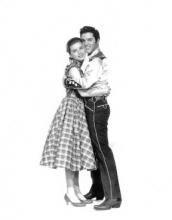
The way fans reacted to Dolores Hart’s decision to become a cloistered nun, you might have thought the movie star had announced her intention to kill herself.
Even close friends and family could not fathom why this Grace Kelly look-alike, who gave Elvis his first on-screen kiss and had her pick of acting jobs, would stow herself away in a nunnery for the rest of her life.
As if to test her resolve in those weeks before she left Hollywood, Universal Studios offered her a role opposite Marlon Brando, a role she turned down shortly after she broke off her engagement to Don Robinson, a kind and handsome businessman who loved her intensely.
On Wednesday during his weekly address, Pope Francis condemned consumerism and the "culture of waste" especially pertaining to food. Wednesday was also the day the United Nations launched an anti-food waste campaign to mark World Environment Day. The UN’s Food and Agriculture Organizatio estimates 1.3 billion tons of food are lost or wasted every year. The Washington Post reports:
“Throwing away food is like stealing from the table of those who are poor and hungry,” he said during his weekly audience in St. Peter’s Square.
Read more here.
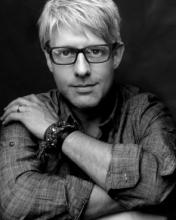
Growing up Roman Catholic in Newfoundland, Matt Maher never imagined that his childhood interest in music would lead to a career as a Grammy-nominated, chart-topping Christian rocker — let alone a crossover artist featured on Christian radio and in evangelical worship.
After he stopped going to Mass as a freshman in high school, Maher wasn’t even sure about his own faith. The idea of maintaining a personal relationship to God seemed a foreign concept.
“Where I grew up, evangelical Christianity really hadn’t made any strides,” said Maher, now 38, describing the mainline religious culture of his wind-swept Canadian homeland.
Listen to any of his catchy, guitar-driven pop-rock anthems, such as his new single, “Lord, I Need You,” and it’s clear God is never far from Maher’s mind these days.